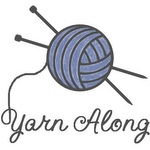This week, I needed to knit something. It didn't matter what it was, though with a toddler I knew it needed to be easy and interruptible. I decided on a chunky scarf in garter stitch, using mondo needles so it would be fast, productive work. I was feeling productive -- feeling as though I simply had to make something with my hands. So I started this project.
I am also immersed in reading for a research project I am working on about the field of library and information science (LIS), and more specifically, the positioning of information literacy within it. This research will hopefully turn into a journal article soon after the new year.
On my second day of working on the scarf, it occurred to me that it might be very productive to alternate reading sections of challenging LIS theoretical scholarly literature, with knitting several rows of my scarf. The goal would be to use the knitting time to process and reflect upon the reading I just did, and then return to the reading refreshed and ready to tackle the next set of ideas.
And so, I tried it... and my goodness, talk about the perfect marriage of two activities. I don't want to say too much about it yet -- I'm not yet in a position to try to figure out why doing these two things together is so successful for me. I need to do it more. And so, I shall.
 |
| "LIS, Method, and Postmodern Science" by Ron Day in Journal of Education and Information Science Education 37.4 (1996): 317-324, and a chunky garter stitched scarf. |
 I plan to link up with Yarn Along at Small Things for as long as I am using knitting as a means of processing and reflecting upon the reading I am doing for my research.
I plan to link up with Yarn Along at Small Things for as long as I am using knitting as a means of processing and reflecting upon the reading I am doing for my research.So, this week's knitting project: the beginnings of a chunky garter stitched scarf.
And this week's reading: an article titled "LIS, Method, and Postmodern Science" by Ron Day. To give a taste of the brain-twisting challenge this article and others like it pose in terms of reading, processing, and understanding, here's a representative snippet:
As a form of knowledge, LIS too must reflectively examine its own historical construction and its methodological procedures in terms of the information flows around and through it. But since information is both the object of study in LIS and is central to the process of postmodern science, the questioning of method in LIS is not simply a reflective gesture within the profession, but is centrally important for postmodern science as a whole. The relation of LIS to postmodern science is like a Möbius strip: the problem of the object involves the problem of the method. For the postmodern science of information studies, "information" constitutes both its "inside" and its "outside." (p. 321)I just love this stuff. And knitting makes me love it even more.











